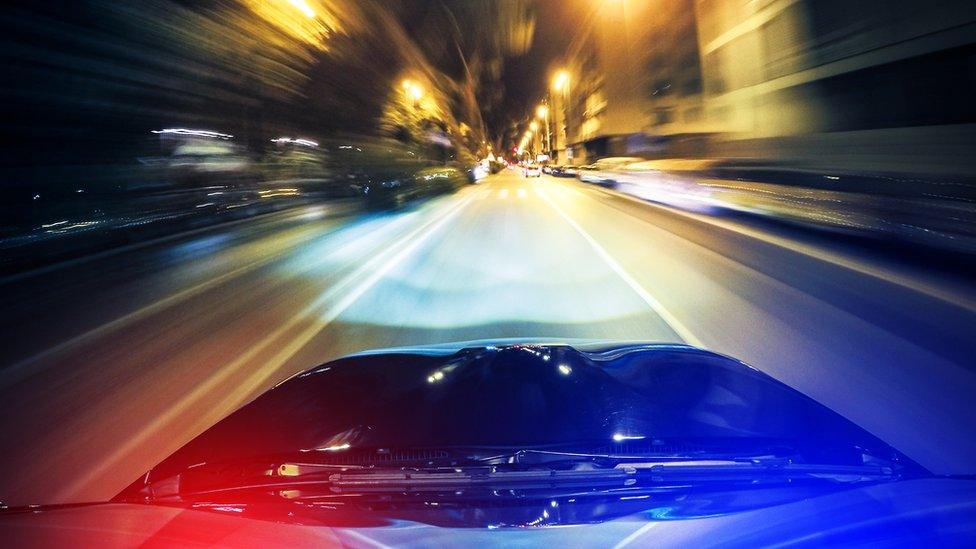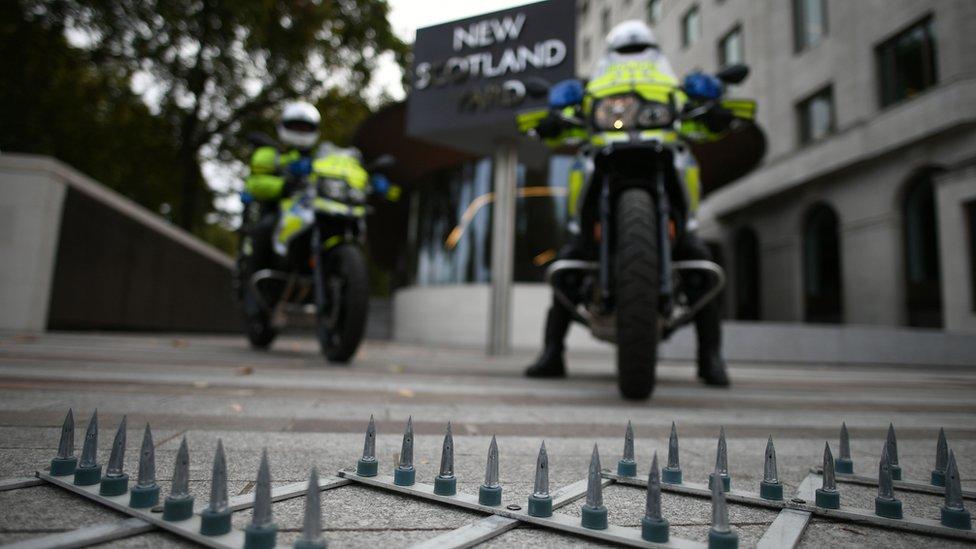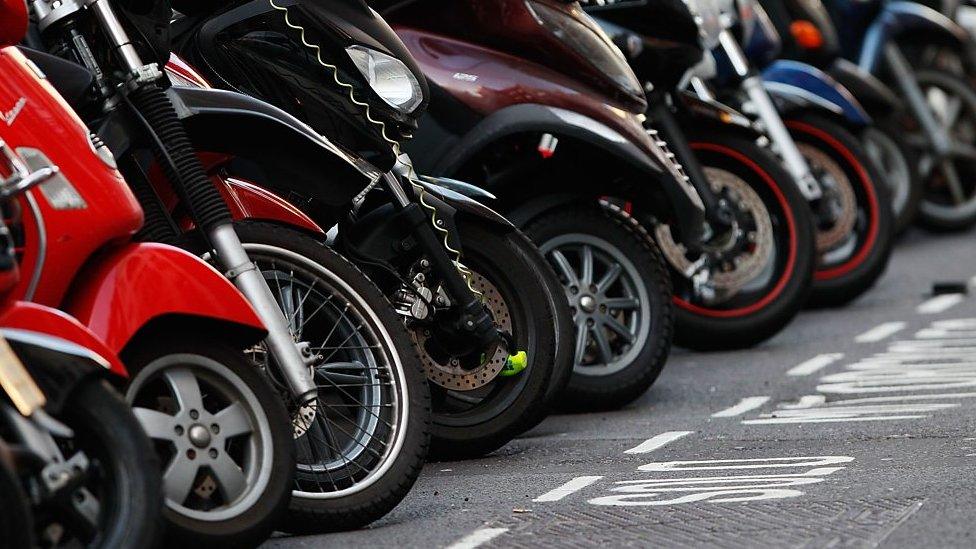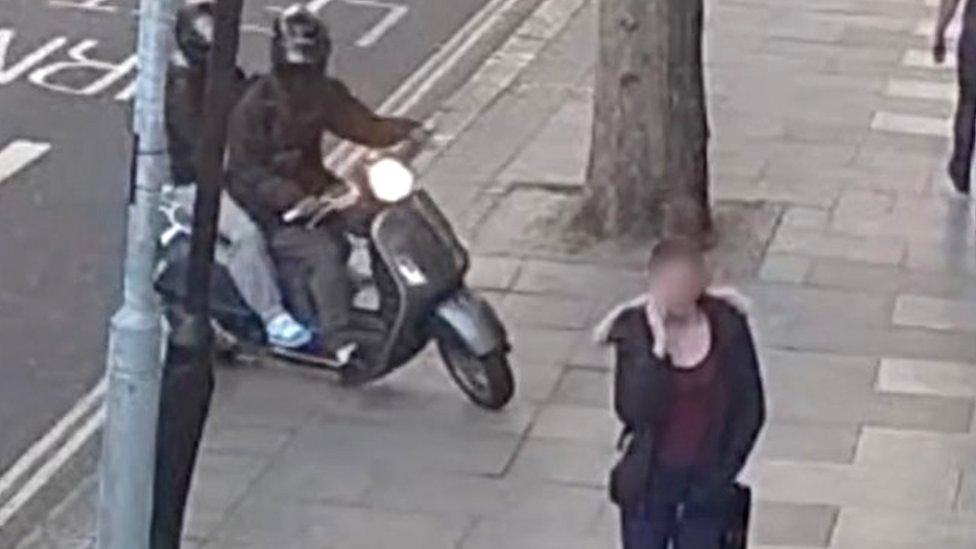Moped crime: My life behind the wheel, by police pursuit driver
- Published

When the call came over the radio it was about 02:00. Dark but dry, there was little traffic on the roads.
"Two lads had been caught mid-burglary with clown bandanas covering their faces," a pursuit-trained police officer tells the BBC, speaking on condition of anonymity.
The officer, whom we're calling David, saw the pair fly past on their moped. But he didn't give chase.
"I just had to watch them go," he says. "We're advised not even to follow them."
The Police Federation has welcomed government plans granting police drivers more legal protection if they are involved in a crash. But what is it like for those police officers behind the wheel?
For David, who joined the police after leaving the army, the frustration with the restrictions placed on officers is palpable.
"I came out of the armed forces and found myself unemployed," he says.
"I was trying to find a job which had the same sense of excitement but also the sense of public duty. I've always had that. I like to feel I'm playing a role in the community."
'Hooked'
The police seemed like a good option. David started as a police community support officer (PCSO) in the Met.
"When I was a PCSO I did an attachment with the emergency response team," he says.
"We went on a high-risk pursuit.
"We were pursuing a van at about 03:00. The helicopter was up. Every available car was involved. There was a foot chase by the train tracks which ended up with me and a suspect on the floor. I got him.
"It was exciting. It was dangerous. But I was hooked."
From there, David's path was set. His first involvement in high-speed pursuits was as an operator - the passenger. But after leaving the Met he found himself on an intense three-week driving course.
There are four levels of drivers in the police, he says. David is currently level three, meaning that if the circumstances require, he is able to break the speed limit, or safely go through red lights, for example, in pursuit of a suspect. He loved the training, but it was tough.
"I'd been driving for over 20 years so there was a lot that needed fixing," he says. "But I could have done another three weeks. It was amazing.
"There are also written tests you need to pass and they're not easy. It's really intense, really in depth. I found Stephen Hawking's A Brief History of Time hard to get through but it was nothing on some of the books you had to read for the exams."

When starting a pursuit, police officers need to plan how to bring it to an end
After passing, David did further pursuit training. He was now qualified - in his new force outside of London - to work on his own as part of the emergency response team.
"My very first blue light run," he remembers, "I felt quite vulnerable. Everything was brand new. In every different police force they use different systems and in the counties there are single crews so you're on your own.
"I was having a coffee, checking my emails - we need to keep on top of ongoing investigations - when an emergency call came through.
"It was about 20 miles away. It was a fantastic drive and such a good feeling being able to respond. It was exciting."
Loss of life
Not all of the pursuits David has been involved with have been so positive. On more than one occasion, people fleeing from his police car have been seriously injured or died after crashing.
In one incident, he recalls, "We'd only been pursuing for about three seconds but unfortunately a young lad lost his life.
"I wasn't actually driving on that occasion. We'd just self-authorised. We were doing a U-turn to start pursuing when his car crashed.
"Our job is high risk a lot of the time. We're held accountable and that's right.
"Every police vehicle has a black box which records where you are, if the blue lights are activated, the G-force. All radio communications are recorded. You're constantly updating your speed, the weather, the conditions, your location.
"If something happens, everything is basically put into lockdown for the facts to be gathered. You need to show that your actions were necessary and you're not intentionally putting anyone in danger or driving recklessly."
"Knowing that you can lose your career and your pension is always at the forefront of your mind."
Stories of moped crime from victims and police
With the Met, David responded to moped crime a lot. There's less of it where he works now, but he says it seems to be increasing.
"If you steal a Land Rover you're probably hoping to sell it on for a profit. But moped crimes are purely for them to commit more crimes on," he explains.
"Once they do something and realise the police respond by stopping their pursuit then they repeat it.
"I've seen suspects escaping on mopeds make a grand gesture of taking their helmets off. They hold them out so they're easier to see.
"The more we let them get away, the more they'll do it. Once they find a loophole they use it."
- Published21 March 2018

- Published22 May 2018
